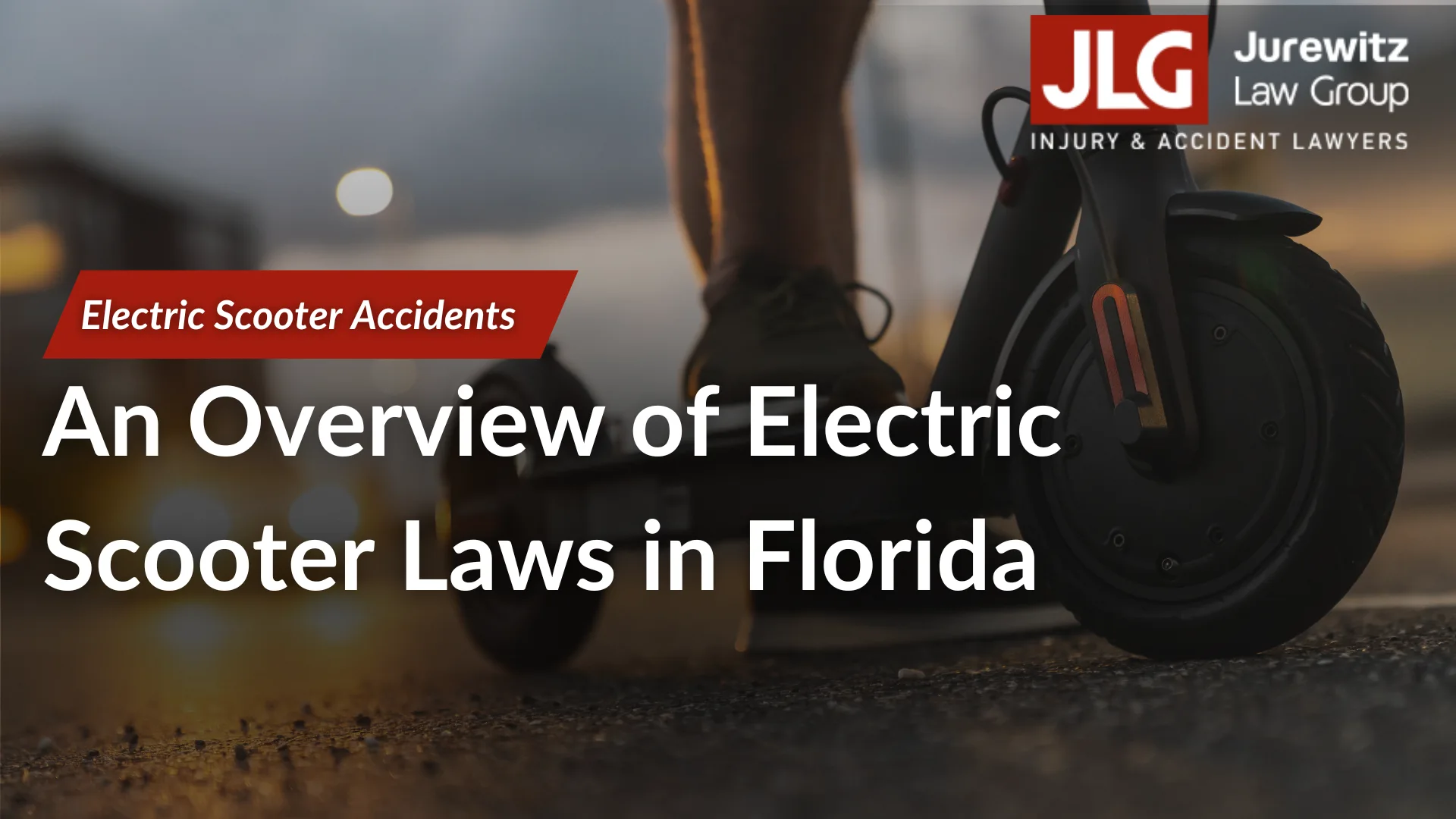
Electric scooters are micro-mobility devices that have grown increasingly popular in Florida recently. In 2019, lawmakers addressed this trend by passing regulations for e-scooter use in Florida. What should you know about the electric scooter laws in Florida?
Understanding electric scooter laws in Florida is essential for anyone who uses one of these vehicles. Familiarizing yourself with these laws can help you stay safe and avoid potential penalties.
E-Scooter Regulations in Florida Mirror Bicycle Regulations
What should you know about electric scooters in Florida? For Florida law, an e-scooter is a “motorized scooter.” A vehicle qualifies as a motorized scooter in Florida if the following apply:
- The vehicle is a motor-powered micro-mobility device
- The electronic vehicle lacks a seat or saddle for an operator
- The electronic vehicle travels on a maximum of three wheels
- The vehicle’s motor can’t allow the vehicle to exceed speeds of 20 miles per hour on level ground
Florida law establishes that most of the duties and responsibilities applicable to bicycle riders in The Sunshine State also apply to e-scooter riders. The only requirements that don’t apply are those that, by their nature, couldn’t apply to e-scooter operators. For example, requirements about carrying a child in a carrier that protects them from a bicycle’s moving parts won’t apply when a rider is on an e-scooter instead of a bike.
The following sections of this overview will cover specific topics, like helmet laws for e-scooter riders in Florida. General and miscellaneous regulations to be aware of include:
- An e-scooter rider can’t “attach” themselves or their vehicle to another vehicle on a roadway (such as by holding onto the back of a moving car while riding a scooter).
- E-scooter riders can’t ride more than two abreast in bike lanes. If they ride two abreast, they must not impede traffic by blocking others while traveling at too low a speed.
- A maximum of 10 e-scooter riders forming a single group may proceed through a stop sign after stopping at it.
Laws aren’t the only regulations that may apply. When renting an e-scooter, the company may also have regulations and policies you must abide by.
Helmet Laws for Electric Scooters in Florida
Are there any helmet use provisions in electric scooter laws in Florida? The following bicycle helmet requirements also apply to e-scooter riders in Florida:
- An e-scooter rider must only wear a helmet if they are under 16 years of age.
- If the law requires an e-scooter rider to wear a helmet, the helmet must fit properly and be fastened with a strap. The helmet must also conform to federal safety standard 16 C.F.R. part 1203.
Check a helmet’s packaging or the helmet itself for an indicator stating it conforms to the applicable federal safety standards.
Riding Electric Scooters on Sidewalks and Roads in Florida
The law states bicyclists should stick to bike lanes when traveling more slowly than most traffic on the road. The same traffic laws apply to e-scooter riders. When no bike lane is available, the law requires riders to remain as close to the right curb as possible.
However, the law also allows municipalities to govern where e-scooter riders can and can’t operate these vehicles. For example, in some towns and cities in Florida, operating an e-scooter on a sidewalk may be legal. However, that’s not universally so throughout the state.
Age Restrictions for E-Scooter Use in Florida
Are there any age restrictions within electric scooter laws in Florida? An e-scooter rider in Florida doesn’t need a license to operate such a vehicle. Age restrictions may vary depending on the municipality and circumstances. For instance, some municipalities may enforce overall age restrictions for e-scooter riders. Others may require riders to be at least 16 to operate street e-scooters. In addition, individual companies may have policies regarding selling or renting e-scooters to minors.
Liability and Insurance for E-Scooter Accidents
Liability can vary when e-scooter wrecks leave victims with head injuries. In some cases, the company from which a rider rented an e-scooter may be liable for injuries. Victims can file insurance claims accordingly to their insurance companies. A company may also be liable if a wreck results from a defect an e-scooter’s designers or manufacturers overlooked.
Florida statute requires drivers to purchase Personal Injury Protection (PIP) insurance before registering vehicles with at least four wheels. Such requirements don’t apply to e-scooters. Thus, PIP coverage usually doesn’t compensate a victim after an e-scooter wreck. However, a victim may be able to purchase additional coverage to seek compensation from their insurer after a crash.
Filing a claim or lawsuit against an e-scooter rider or other such party who caused a wreck may be an option for a victim pursuing compensation. That said, whether this is an option can depend on whether the at-fault party has insurance, whether they have the means to pay damages, etc.
DUI Laws and Electric Scooters in Florida
 What electric scooter laws in Florida should you know concerning drinking under the influence? Bicyclists in Florida generally have to abide by the same DUI laws that motorists have to abide by. This means e-scooter riders need to abide by these motor vehicle laws as well.
What electric scooter laws in Florida should you know concerning drinking under the influence? Bicyclists in Florida generally have to abide by the same DUI laws that motorists have to abide by. This means e-scooter riders need to abide by these motor vehicle laws as well.
Florida state law states an e-scooter rider may be guilty of a DUI if any of the following apply:
- They operate an e-scooter while their “normal faculties” are impaired due to the influence of alcohol, a chemical substance, or a controlled substance
- They operate an e-scooter with a BAC of at least 0.08 (based on the results of either a blood or breath test)
Never operate an e-scooter unless you’re able to do so safely. Along with intoxication, fatigue could interfere with your ability to operate an e-scooter safely.
Local Ordinances for Electric Scooters May Vary
Individual municipalities may have their laws, ordinances, and regulations for e-scooter use. Familiarize yourself with applicable local ordinances to ensure you abide by the laws in your area when riding an e-scooter in Florida.
Contact a Florida E-Scooter Accident Injury Lawyer
Don’t know much about electric scooter laws in Florida? Not all e-scooter users abide by these regulations. Perhaps you’ve been hurt in a Florida e-scooter accident (whether as a rider or pedestrian) due to someone else’s carelessness.
You may be eligible for financial compensation if so. For more information, discuss your case with a Tampa personal injury lawyer at Jurewitz Law Group Injury & Accident Lawyers. Our team of personal injury lawyers can help you better understand your legal options. You could also discuss similar legal options with our Tampa pedestrian accident and Tampa bicycle accident lawyers for more cases similar to e-Scooter accidents. Our representation may also improve your chances of receiving the compensation for which you’re eligible. Contact us online or call us at (619) 233-5020 for a free case review.


